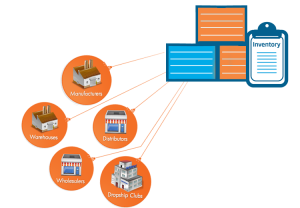For many entrepreneurs, this is a boring duty: taking inventory. Many start-ups and small businesses in particular find it difficult to take stock on a regular basis, especially since it often takes a lot of staff. That’s why we tell you exactly what is behind the term trading and the details you need to pay attention to in a proper inventory. And to make sure your next inventory goes as smoothly as possible, we also give you tips and tricks on how you can do the annual inventory as easily and quickly as possible.
Inventories are not only necessary because required by law, they are also important in order to be able to assess the value of your own business. Besides, this is nothing new: more than 500 years ago, the Italian mathematician Luca Pacioli, a good friend of Leonardo da Vinci, recognized it. He not only described in his work double-entry bookkeeping, which Italian merchants were already using at the time, but he also advised entrepreneurs of his day to use inventory as the basis of their own balance sheet.
Inventory: definition of such an inventory
With inventory, you determine the current composition of your assets and debts. All the assets (and all debts) of a business should be listed. The purpose of this procedure is to determine the actual inventory. Merchants and contractors should have regularly determined what is in their warehouses using their commodity management systems. An inventory now determines if these inventories were correct. It is not uncommon for the actual inventory (the result of the inventory) not to match the accounting inventory. The inventory therefore has three main tasks:
- The inventory is the basis of your annual accounts
- The inventory is used to discover losses, thefts, etc.
- You can correct inventory accounting with inventory.
Several principles must be taken into account for a properly carried out inventory. These are based on the principles of appropriate accounting:
Completeness: All stocks must be included in the inventory with their correct value.
Accuracy: the type, quantity and value of the goods must be indicated correctly.
Profitability: In some situations, if it is unreasonable to expect the exact quantity of a particular good, it can be estimated.
Materiality: according to this principle, fixed assets with a value of less than 60 euros should not be included in the inventory.
Clarity: Individual stocks should be clearly identified so that they can also be allocated later.
Verifiability: The inventory list should be clearly structured so that even third-party experts can verify its content.
Speed: Entrepreneurs must complete their inventory by a certain deadline, in most cases on the deadline.
Individual recording: in principle, each asset and each debt are recorded individually in the inventory.
Who should keep an inventory?
Any person, natural or legal, carrying on a business, must keep an inventory book. While the latter is an essential element for establishing the balance sheet, this balance sheet is not compulsory for everyone.
The inventory book contains all of the assets and liabilities of a business. It therefore allows you to have a good overview of your economic activity through inventory software for small business. This is an obligation only if your activity concerns the exploitation of finished products and / or raw materials.
For more details, please visit: alfacybernetics.com
 Universal Bloggers
Universal Bloggers




